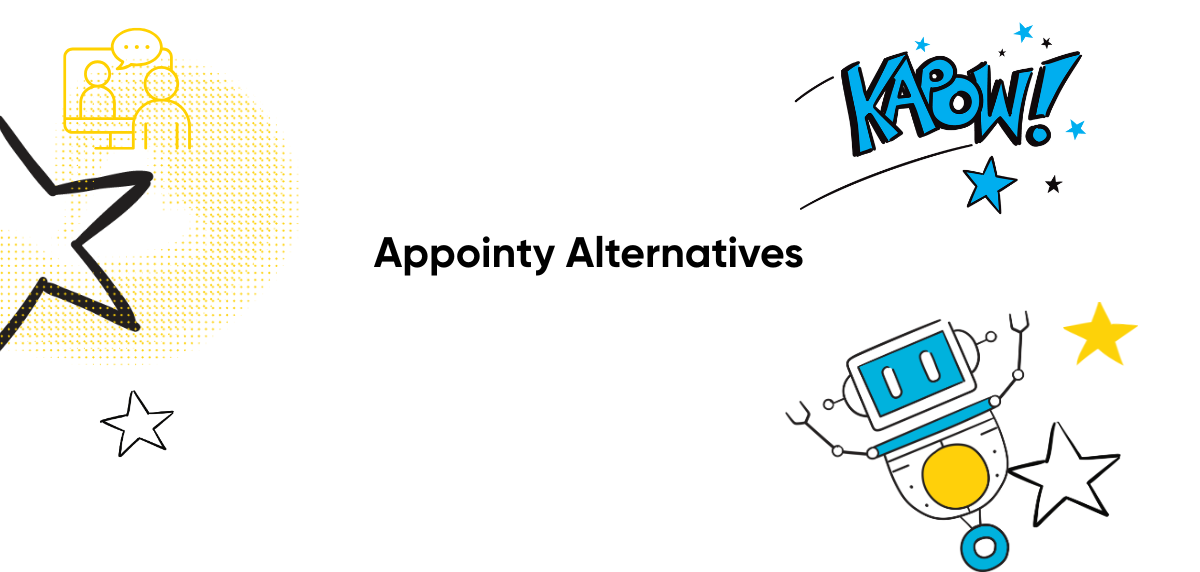Appointy is a popular online booking tool, used across different industries. It supports individual and group bookings, automated reminders and integrates with Google Calendar and Zoom.
But for commercial training providers its not an ideal solution. It can lack the scheduling flexibility training providers need, doesn’t support different course structures, and has minimal integration options.
There’s no built in calendar for resource scheduling and allocation, and it doesn’t support recurring multi-session courses, presenter scheduling or training-specific reporting.
If your organization delivers structured training, whether public courses, private client or blended programs, then you may want to seek an alternative, and in this guide we cover six alternatives for you to consider.
The features training providers need in a training scheduling and and booking system
The features training providers need to schedule their courses, and training are a little different from generic scheduling tools:
Support for multi-session and recurring courses
Training providers need to be able to schedule courses with multiple sessions, dates and delivery modes. For example, you need to be able to:
- Build different course structures e.g. Day 1-3 in-person, Day 4 Online
- Manage individual session logistics like venues, times and presenters
- Handle session prerequisites and progression logic.
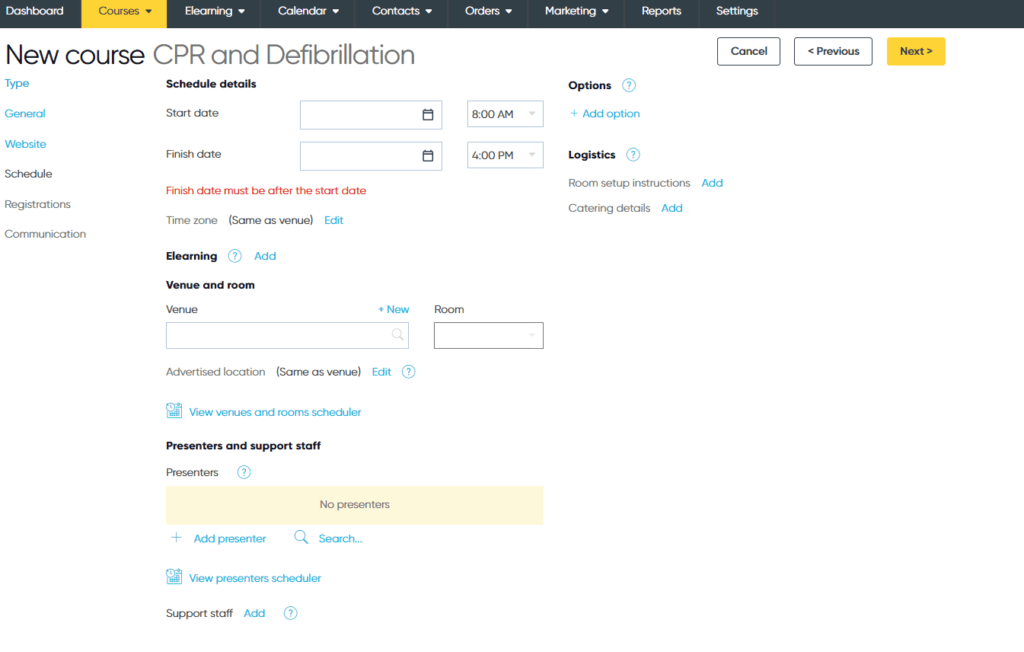
Public and private course management
Training providers often run both public courses and private sessions for clients. To effectively do this a platform needs to support:
- Private course setup with invite only access or hidden pages
- Custom pricing, dates, and content for private clients
- Branded portals for extended enterprise training delivery

Automated scheduling features for instructors, venues and resources
Its not just scheduling courses that’s important, for in-person courses the platform you use needs to be able to coordinate venues and instructors. Features to look out for include:
- Availability search for venues and trainers
- Conflict detection to prevent double-booking
- Calendar views filtered by course, trainer or location
- Bull scheduling for repeat courses
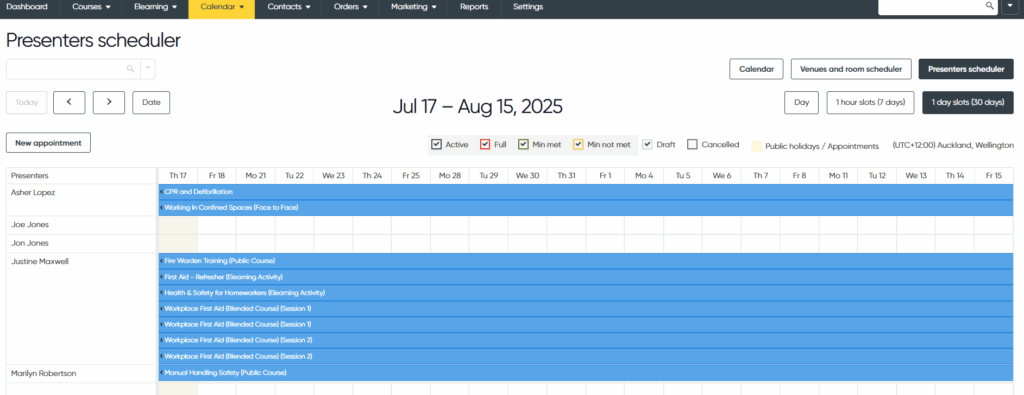
Online registration and payments
Features that make it easy for learners or client contracts to register and pay online:
- Customisable registration forms (individual and group)
- Mutli-attendee and multi-course order options
- Payment options – credit card, invoice, account billing, and other options such as AfterPay (ClearPay in the UK), Apple Pay and Klarna
- Automatic invoicing, credit notes, and tax calculations
CRM Integration or Built-In CRM features
Training businesses need to track customers, registrations, communications and outcomes. Features to keep an eye out for:
- Store contact and organsiation records
- Track past course attendance and performance
- Manage leads, tasks, and account relationships
- Integrations with popular CRMs such as Salesforce and HubSpot.
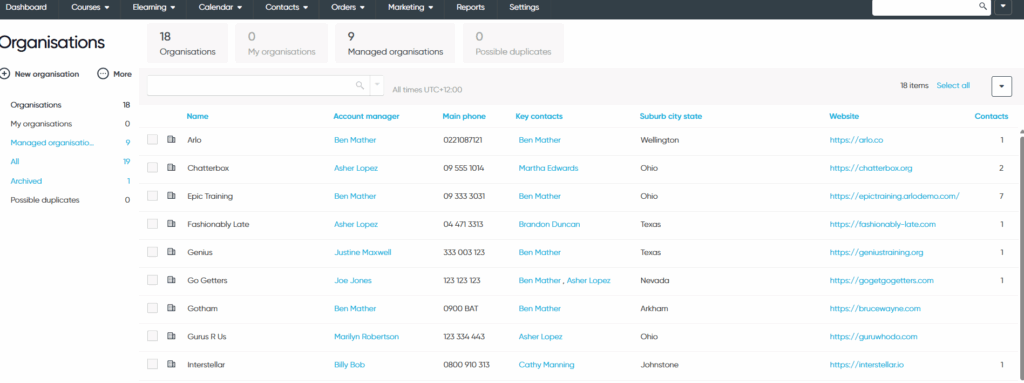
Website Integration For Seamless Course Display
Ideally the platform should integrate with your website through an integration with your CMS e.g. WordPress, or API or webcontrols. Other website features that are handy, include:
- Manage live coure listings, that show real time availability
- SEO friendly course page templates with filters, categories and tabs
- Optional self service portals for learners or clients.
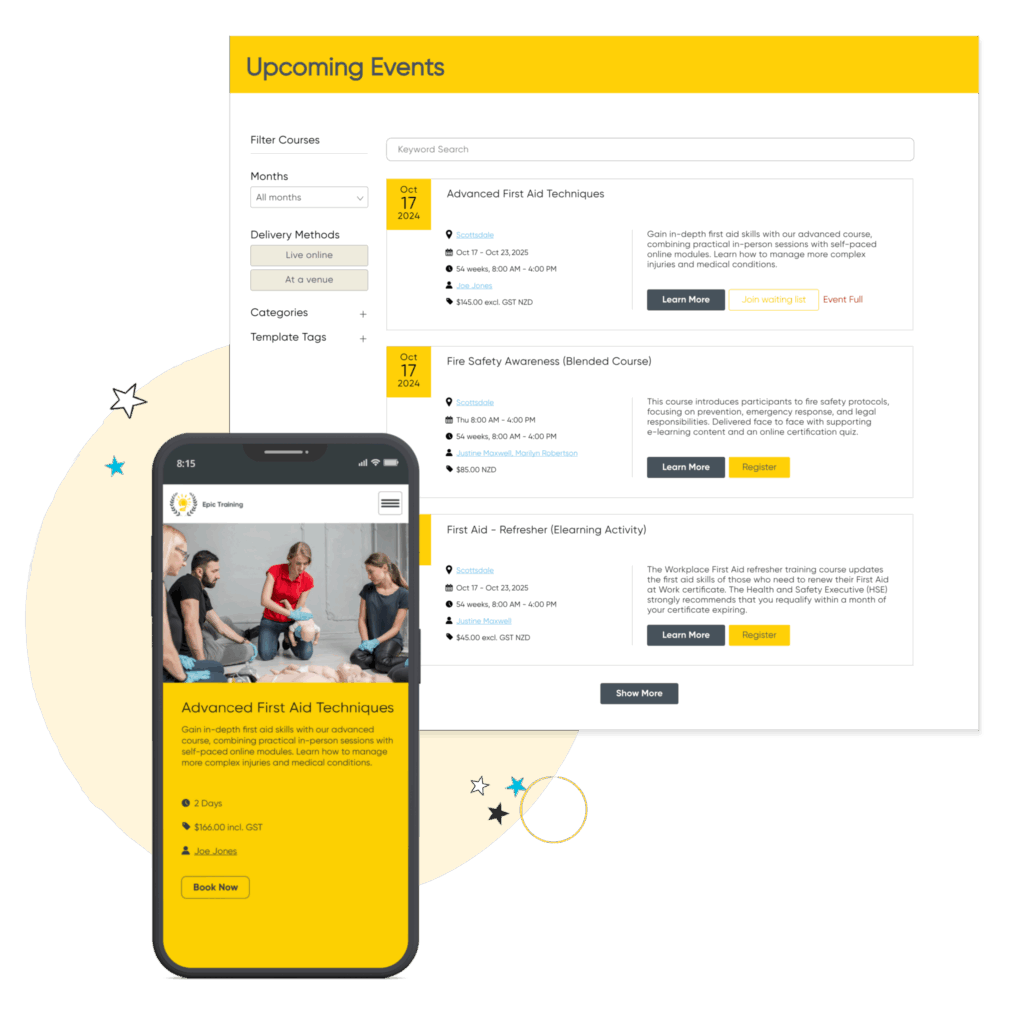
Now you know some of the features to look out for, here are some Appointy alternatives to consider:
1. Arlo Training Management Software
Arlo is a training management system built specifically for training providers.
Unlike Appointy, which focuses on appointment scheduling, Arlo’s training scheduling system supports the full course-lifestyle – from course creation, scheduling, and registrations, through to presenter coordination, payment processing and reporting.
Here’s how these features work:
Course creation and scheduling
Inside Arlo, you can get started by creating a new course from scratch, or if you want to speed up the process you can use a pre-existing template from an extensive template library.
When you create a new course using a template key information will be pre-filled that you can then edit and save. You can then re-use the template as many times as you like, making it easy to schedule repeat courses on multiple dates and locations.
Multiple delivery formats are supported including, face-to-face, live-online, blended, and self-paced courses. So, you have the flexibility to deliver your learning in the format most beneficial to your learners. Within this wizard you can also set up a course to be a one-off, multi-session, or recurring.

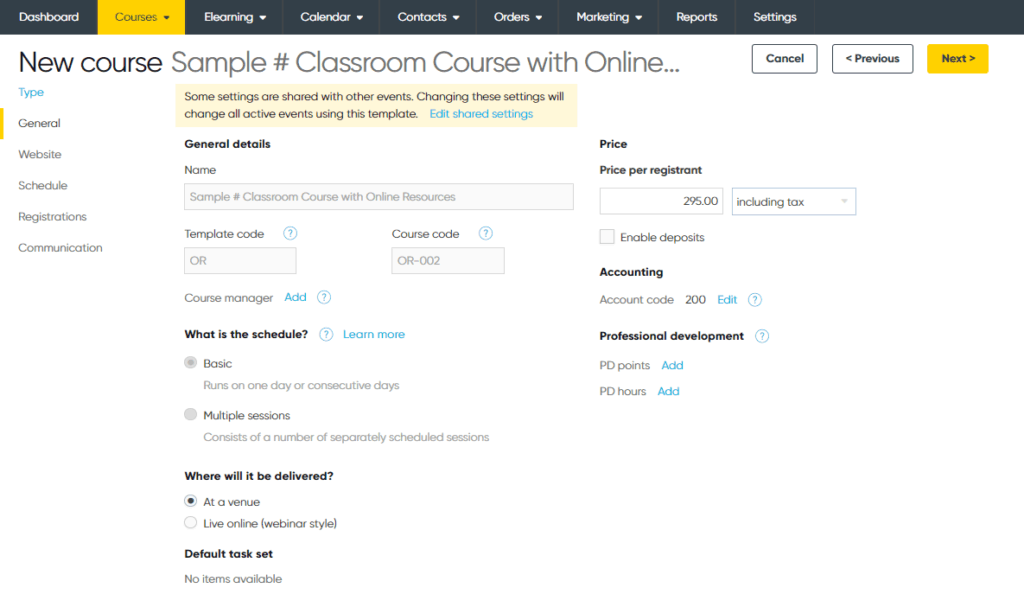
Inside of the set-up wizard, you can also handle all of the logistical elements of a course, such as setting the venue, room or virtual location, selecting an instructor for the course, or a particular module and more.
If you’ve integrated Arlo to your website, when you press publish the course will be immediately displayed on your website ready to take registrations.
Before you press publish, you have complete control over the branding, formatting, and layout for how your courses appear. You can also edit any details after publishing.
You can see how this works in the images below:


Other key Arlo features for training course scheduling & booking
Learner self-service: Branded portals let clients and learners view upcoming training, register, access course materials, and download certificates.
Flexible, conversion-optimized registration forms with support for multiple courses and participants, vouchers, waitlists, payment options (credit card, invoice, bank transfer), automated confirmations, accounting integrations (e.g. Xero), self-service transfers and cancellations, and an optional branded customer portal.
Integrated CRM and lead management: Track client organizations, manage sales pipelines, assign account owners, log communications, and maintain complete learner records—all fully connected to your scheduling and registration workflows.
Automated class communications: Arlo lets you automate the entire communication flow for each course, confirmation emails for instructors and venues, registration confirmations, reminders, post-class follow-ups, attendance reports, and automated certificate delivery to learners. You can also send tailored communications to attendees and non-attendees with relevant materials.
In-depth course reporting: Access a wide range of reports covering registration volumes, revenue performance, outstanding payments, and attendance. Set report favorites, schedule automated report delivery to stakeholders, and combine data across sources to track profitability, class occupancy, and overall training performance.
If you like the sounds of Arlo and what to try out all fo these features, you can get started with a free trial below 👇
Deliver better training with Arlo. Start a free 14-day trial today.
2. Calendly
Calendly is a widely used scheduling tool. It’s suitable for coaches or individual training providers, particularly if you;re providing virtual training. Calendly handles email and SMS notifications, and integrates with tools like Zoom and google meet, and connect to external calendars to prevent conflicts.
It’s a great tool for booking one-on-one sessions, its functionality is best suited to individual training appointments rather than structured training programs.
Key Features
- Event types with custom rules: Create one-on-one or group events with buffer times, duration limits, and advanced availability controls.
- Calendar integration: Syncs with Google, Outlook, and iCloud to avoid double bookings.
- Automated communications: Sends confirmation emails, reminder messages, and follow-ups via email or SMS.
- Routing forms and workflows: Use logic-based questions to route users to different booking options or team members.
Video conferencing integrations: Automatically generates links for Zoom, Google Meet, Microsoft Teams, and others.
3. Moodle with Scheduling Plugins
Moodle is a great option to check out if you’re delivering structured multi-session courses. and structured training programs.
Its not a scheduling tool on it owns, but it fulfils the course side with course creation, instructor roles, grading and assessment features.
One plugin option to consider is Arlo for Moodle.
- Shopping carts and payments – Arlo’s plugin adds the ability for Moodle users to take payments, offer discounts, manage invoices, credit notes and multi-registration orders with a full-featured ecommerce engine.
- CRM: Track client relationships, manage leads, and track learning outcomes across online and in-person training.
- Website Integration: Embed course listings, schedules and registratiomns form into your CMS such as WordPress and others.
- Classroom course management: Schedule venues, trainers and manage attendacne, waitlist lists and automated comms.
- Live online training delivery: Promote and run webinars using integrated tools such as Zoom and Go
- Mobile app for trainers: trainers can access schedules. record attednance, check registrations and send updates from their phone.
Of course, Arlo isn’t the only plugin, you can view a whole library of different plugins in Moodle’s plugins store.
4. Wix or WordPress with Booking Plugin
A low cost option is to use a website builder like Wix or WordPress, that allows control over your site’s design, structure and branding, and then to pair it with a scheduling and booking plugin.
When you pair a flexible website builder with a plugin it becomes a viable option for smaller training businesses looking to manage online course registrations and bookings with a custom website.
While its not a perfect solution for training management, its ecosystem of apps and integrations allows for course scheduling functionality, particularly for training businesses that run one-off sessions, or coaching.
Key features for both include:
- An online booking system for group bookings or on-on-one training sessions, with automated confirmations
- An online booking system for group bookings or on-on-one training sessions, with automated confirmations and payment processing.
- Calendar sync with Google Calendar
- Ability to assign sessions to instructors
- Customisable registration forms, and integrated online payments through Stripe, PayPal and other payment providers and payment processing.
What Training Providers Gain by Choosing the Right Scheduling & Booking Platform
Switching from a generic booking tool like Appointy to a more training focussed solution like Srlo, can bring your training busienss numerous benefits:
- Save valuable time by automating repetitive admin like sending emails, tracking registrations, issuing invoices, and managing cancellations or transfers. This frees up your team to focus on course quality and business growth
- Accept payments on your terms, and with integrations into accounting platforms like Xero, you reduce payment errors and speed up cash flow
- Offer branded, conversion optimizaed course booking pages that make it easy for individuals or clients to sign up multiple learners, choose dates, apply vouchers, and manage changes.
- Replace disconnected tools with an all in one platform that handles course creation, CRM, scheduling, communications and reporting Your whole team works from one source of truth, reducing handoffs and friction.
- Access real-time dashboards and scheduled reports showing registration numbers, revenue by course, trainer utilisation and client engagement to see exactly how your training business is performing, and to get a birdseye view of your business operations.
The end result of all of this is a high-functioning training business that runs efficiently, delivers a better learner experience, and has the visibility and control needed to grow profitably.
